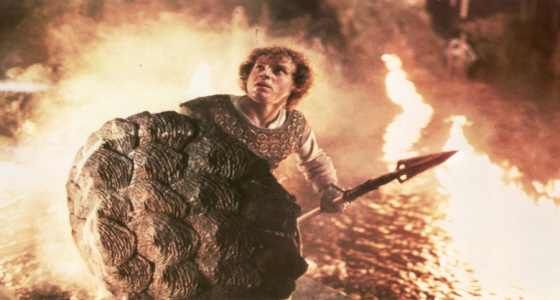
Everybody and their dog knows that the twenty-first century's global music industry is in a state of decline and flux. Physical sales keep plummeting – according to the BPI, CD sales keep falling, year after year – and constantly evolving digital consumption seems to be both impacting on sales due to content treasure troves such as YouTube and Grooveshark providing free access to, well, pretty much everything, and flummoxing an ageing music industry huffing and puffing behind this constant evolution, trying to catch up. The proliferation of the digital format has generally been Scapegoat Numero Uno in terms of pointing the finger of blame at the once omnipotent music industry's decline and fragmentation, but what if there was another factor lurking behind this most obvious of Things Wot We Can Blaym? What if there was an all-encompassing yet overlooked key influence, one that a weighty proportion of individuals on the planet interacts with every single day, that has, undetected to most, caused this seismic shift in music consumers' migration from buying music? What if – whisper it – our friendly neighbourhood social networking site was responsible?
POP MUSIC AND WESTERN SOCIETY'S SOUL: A BRIEF OVERVIEW
I shall posit here that popular music's primary function, one that transcends its manifestation as merely another form of art, is to reflect society and its various nuances at a certain point in time. From rock'n'roll's gleeful battle cries of baby-boomer generation liberation through The Beatles' loved-up semi-nonsensical peace/love/marmalade skies musings, to the Sex Pistols' defiant nihilism faced with a future they didn't believe existed and hip hop's progression from a marginal subculture documenting life on the wrong side of the tracks to bling-bling rocks'n'Courvoisier, guns'n'asses brag machine, pop's success has been built on its singular ability to answer society's call when it needs to articulate itself. It is a perennial capitaliser. It offers itself unto you to understand and help you make sense of your life and not only is it a friend, it is the law and it is right. So cocksure have the primary exponents of many – if not all – of the great pop movements been, their wisdom is seldom questioned and many see the fruits of their labours as a historically accurate document, a definitive one, even. Presley, Lennon, Strummer, Lydon, Jackson, Gallagher, all of the Spice Girls, these protagonists of seismic cultural change all have one thing in common – magnetic confidence and complete assuredness that the message they were spreading was just right. Of course, we now all know about Presley's problems, Lennon's insecurities, Jackson's fragility and even the great Joe Strummer's weaknesses, but these people all gave us something we needed – support and advice, for even if their music wasn't written for us, they were singing it to us.
 MASLOW'S HIERARCHY OF NEEDS
MASLOW'S HIERARCHY OF NEEDSLet us now trudge into the misty fields of psychology, and in particular Abraham Maslow's seminal 'hierarchy of needs' theory. In this, Maslow suggested after conducting studies that human beings are in thrall to five different strata of basic needs;
- physiological (breathing, food, water, sex, sleep, homeostasis, excretion)
- safety (security of body, employment, resources, morality, the family, health, property)
- love/belonging (friendship, family, sexual intimacy)
- esteem (self-esteem, confidence, achievement, respect of others, respect by others)
- self-actualistion (morality, creativity, spontaneity, problem solving, lack of prejudice, acceptance of facts)
These strata are usually presented in diagram form as a pyramid, with physiological needs at the bottom and self-actualisation at the peak.
Let's do away with the first two groups of needs – physiological and safety; these are very much intrinsic with a person's micro-environment, rather than the environmental macro-, and rather fundamental to our general survival. Let us go with the lesser, higher needs – the ones nearer the top of the pyramid, and presume that the primary consumers of popular music are teenagers, as per the age-old gag "What's forty foot long and has seven pubic hairs? The front row at a *insert name of popular beat combo-of-the-day here* concert." Double arf!
Love and belonging has forever been the bane of the average teen's life. One's tenure as a teenager going through school is a time of abject heartbreak, of rebuttal, refusal and being chucked in bins. Well, mine was anyway. All we want is to be loved, to belong, and we'll be damned if ma and pa are going to get in the way of all that by being so... bloody... embarrassing. But what's this?! It's Oasis on the radio! Singing their seminal A-side that never was, 'Acquiesce', with its beautifully enticing chorus line of "we need each other/ we believe in one another". Ye fucking gads, this is it! What I've been looking for! I've found my kind! They love me! They're my family! They understand me and the pain I'm going through that I could never justify because it's so goddamn awful and horrible, whatever it is that it is, which is so obviously terrible and my bleeding, scorched mind is trying to protect me from this awful truth! Pop music has the ability to invoke a feeling of camaraderie in the listener, in its soaring pentatonic progressions, soothing minor chords and cheeky sevenths. Not to mention, of course, the lyrics, penned especially for you by a similarly disenfranchised, disenchanted youth who just happens to be having an awesome time and making millions of pounds. Doesn't matter, like. THEY UNDERSTAND ME!

Esteem is another tricky one for your average pop consumer to conquer. Kids can be cruel, William Golding didn't get all of his ideas for 'Lord of the Flies' from the ether. Once our adolescent hero has found his wise sage within the speakers of his stereo, the next step is to find similar minds in the big wide world. It's no revelation that fans of the same artists migrate toward one another, seeking solace and reassurance from those that can validate their own tastes – and therefore their character – by virtue of theirs. Subculture grouping is one of the most essential social tools in modern society, as it – in theory, anyway – allows everyone to find, and have, a voice and build up their strength of character through the support and respect of others with shared interests. A good portion of the time, these subcultures are informed not by film, or sport – important as they are – but music and the fashions and societal nuances it forms. Let's face it; your average Smiths fan wouldn't stand a gnat's knacker of a chance if The Smiths didn't exist.
Self-actualisation is a stratum very few of us achieve. It is to realise and achieve one's true potential. To do what it is that we're meant to do, and do it to a standard that gives us pleasure and satisfies us. For a lot of youths, having had their lives irrevocably changed for the better through the discovery of their favourite music, it's trying to emulate their idols in the hope of equalling or perhaps bettering them. Most fail, but have become sufficiently imbued with ambition, drive and confidence by this point to be able to chase their goals in other fields. Arguably, music is the big bang factor in this.
THE SOCIAL NETWORKING SLEEPER INVASION
Facebook, I'm looking at you.
While perhaps the most innocuous-seeming of all the various social networking machines, with it's pale, simple, uniform blue-and-white colour scheme and standardised font, Mark Zuckerberg's networking behemoth has pioneered an incredible shift in the way we communicate, form social groups, and express ourselves. Zuckerberg – a Harvard psychology student when he created Facebook in 2003, no less – has created a hugely profitable business that is centred around pandering to and fulfilling our psychological needs as human beings, something which popular music had very nearly a monopoly on until very recently.
 Aristotle once mused "What is a friend? A single soul in two bodies." Not any more, sunshine. At the most basic level, Facebook's existence relies on its users becoming linked up as 'friends'. One party sends a 'friend request', the intended can choose to accept or deny it. The depth of these 'friendships' differs wildly, from – as Psychology Today postulates – those with meaningful ties, as sought out and maintained by those with high emotional intelligence, to career-sustaining links as practiced by those with a more Machiavellian bent. Genuine right through to tenuous, in other words. The point here is that Facebook allows its users to tailor their friendship groups to suit their belonging needs in a way that is difficult to execute in the real, physical world, and maintain contact 24/7 via a quick and easy-to-use online interface. There is simply less need for pop music to empathise with our youthful champ and to fill them with a sense of belonging and friendship, because this friendship is quantifiable on Facebook. A friend of mine, well into adulthood, recently divulged to me in the pub that an old friend of his with whom he had a dispute had deleted him from his Facebook friends list, with absolute incredulity. Such is the value of our digital sphere these days – Facebook friendship matters.
Aristotle once mused "What is a friend? A single soul in two bodies." Not any more, sunshine. At the most basic level, Facebook's existence relies on its users becoming linked up as 'friends'. One party sends a 'friend request', the intended can choose to accept or deny it. The depth of these 'friendships' differs wildly, from – as Psychology Today postulates – those with meaningful ties, as sought out and maintained by those with high emotional intelligence, to career-sustaining links as practiced by those with a more Machiavellian bent. Genuine right through to tenuous, in other words. The point here is that Facebook allows its users to tailor their friendship groups to suit their belonging needs in a way that is difficult to execute in the real, physical world, and maintain contact 24/7 via a quick and easy-to-use online interface. There is simply less need for pop music to empathise with our youthful champ and to fill them with a sense of belonging and friendship, because this friendship is quantifiable on Facebook. A friend of mine, well into adulthood, recently divulged to me in the pub that an old friend of his with whom he had a dispute had deleted him from his Facebook friends list, with absolute incredulity. Such is the value of our digital sphere these days – Facebook friendship matters.Esteem and respect are closely linked to the bonds we form with friends, and this particular need's satiation is manifested in Facebook's 'comment' and 'like' functions. For those who are uninitiated – really? – these are both ways in which a Facebook user's friends can interact with them, by providing commentary and feedback, or just letting them know they like something. The more active a user's corner of Facebook becomes, the more their esteem grows – let's call it the esteem:approval ratio, something that makes as much sense in the real world. For someone to bother interacting to even the most random post implies a level of respect that warrants the interactive exchange. Another one of pop music's functions gently picked up and carried over to another medium.
Finally, self-actualisation. This is harder to qualify – as mentioned earlier in this piece, very few people achieve it. The people one is likely to be connected with on Facebook are ordinary folks just like them. There's not an awful lot of scope for achieving and exceeding one's true potential, unless that potential is doing the dishes better than Mary or looking forward to Friday more than Roger, although I can confidently affirm that Roger's enthusiasm for Friday is absolute bobbins fluff compared to mine. What I propose here is that this is the only level of Maslow's needs that is hindered by social networking – assuming people listen to less music due to spending more time on social networking sites that serve the same psychological needs, the type of person they compare themselves with are likely to be their Facebook friends. This, I believe, can lead in a number of directions, of which I shall identify two:

1) People are striving for a lower level of comparative achievement, resulting in lower-level goals and the cancelling out of true self-actualistion
2) Instead of striving to better themselves, Facebook users compare themselves to other users negatively, envying their possessions, holidays, the level of a good time they purport to be having, and thereby decrease their esteem levels and drop down a level on Maslow's hierarchy
On this level, at least, pop still has a strong grip. Or should have, at least.
CONCLUSION
Due to time and space, this piece, though smattered with a few facts, is largely speculation with plenty of room for further research, It does seem, though, that Facebook serves a good deal of intrinsic psychological functions that people thrive on, and that pop music used to cater for almost exclusively. There seems to be simply less of a need to listen to our favourite singers, when we can eke out empathy, understanding and a sense of tribe from our e-friends in the time it takes to put a CD on the deck. Perhaps that's why pop was so popular – we needed it more than wanted it. Final thought: The Guardian reported earlier this year that UK music sales have declined for the seventh year running. Where does that take us back to? The advent of Facebook in the UK.
© Words – Alex Gold





